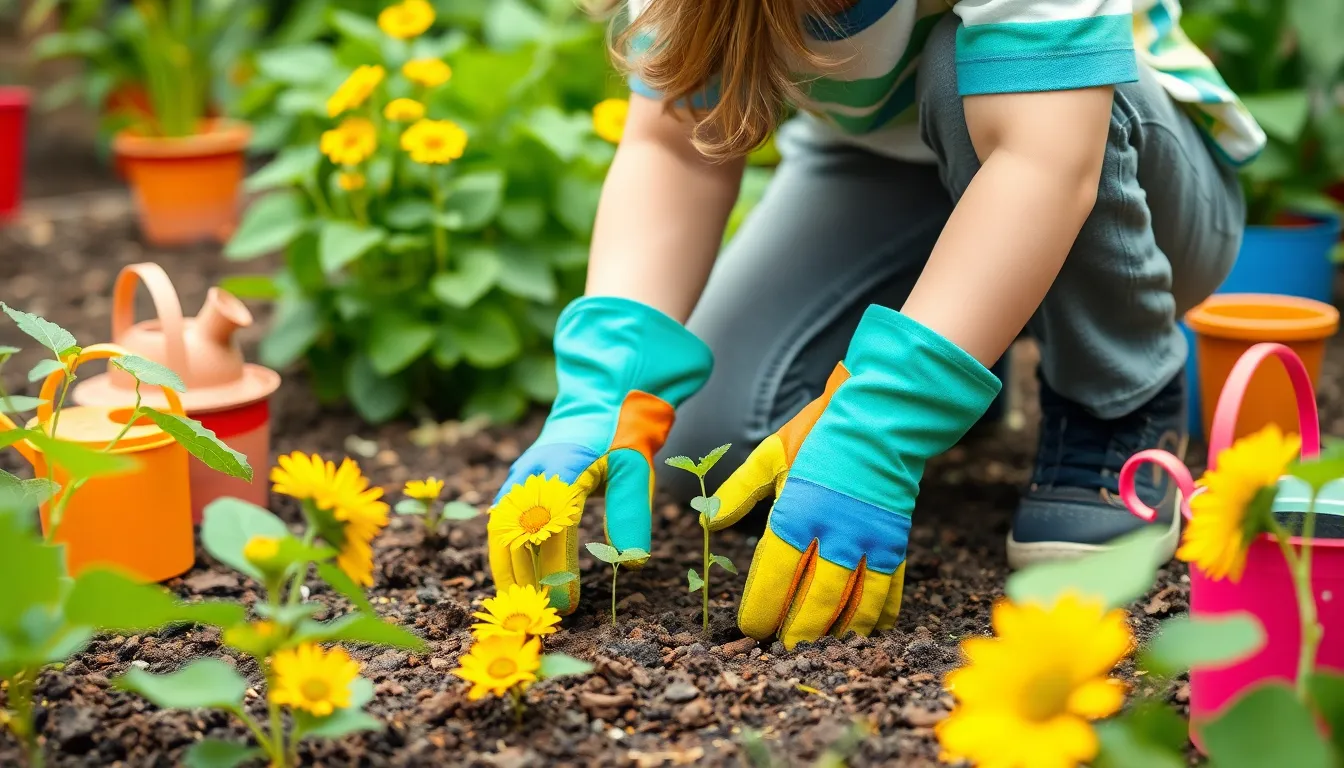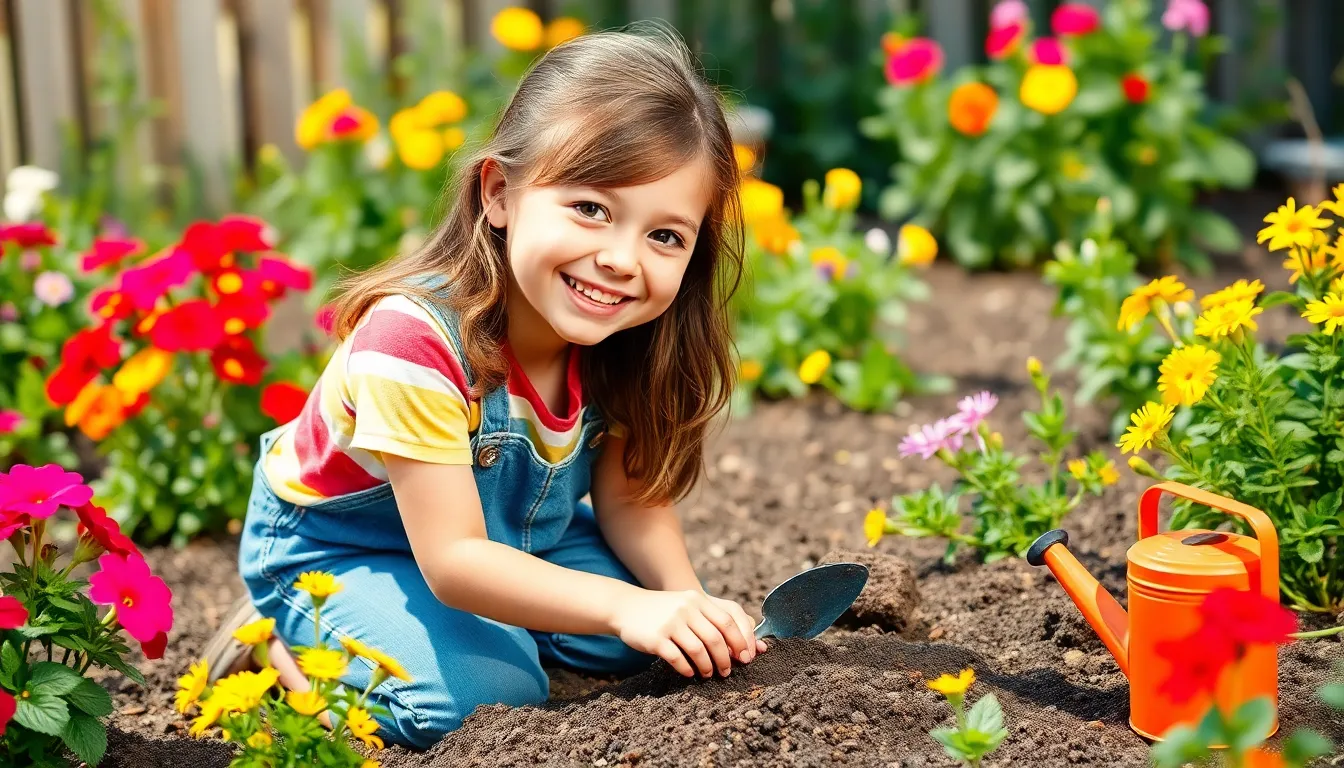Gardening isn’t just for adults with green thumbs and questionable sun hats. It’s a magical world waiting for kids to dig in! Imagine the look on a child’s face when they plant a seed and watch it sprout into a vibrant plant. Gardening for kids is not only a fun way to connect with nature; it’s also an adventure that teaches responsibility, patience, and the joy of nurturing life.
Table of Contents
ToggleBenefits of Gardening for Kids
Gardening offers numerous benefits for children, promoting both their physical and mental well-being. An engaging activity, gardening helps kids connect with nature in meaningful ways.
Physical Health Advantages
Gardening encourages physical activity, which can reduce the risk of obesity. Kids strengthen their muscles while digging, planting, and weeding. They improve coordination as they handle tools and seeds. Exposure to fresh air enhances their vitamin D levels. Additionally, gardening fosters healthy eating habits, as children learn about fruits and vegetables. They tend to eat more produce when they grow it themselves. The act of caring for plants contributes to overall wellness.
Mental Health Benefits
Gardening significantly boosts children’s mental health. Engaging with plants lowers stress levels, promoting feelings of calm and happiness. Kids experience increased self-esteem from nurturing and witnessing plant growth. Such responsibilities cultivate focus and patience, essential skills in everyday life. Gardening can also serve as a creative outlet, allowing kids to express themselves through color and design. Interacting with nature often fosters a sense of connection and belonging.
Getting Started with Gardening

Gardening introduces kids to the beauty of nature while encouraging hands-on learning. Engaging with plants cultivates curiosity and fosters an understanding of the environment.
Choosing the Right Plants
Selecting plants that match children’s interests enhances the gardening experience. Start with easy-to-grow options like sunflowers, radishes, or beans, as they sprout quickly and create excitement. Many children enjoy colorful flowers or tasty vegetables. Incorporating native plants also supports local ecosystems, making the activity educational. Make choices based on the local climate and season. Ideal plants might thrive outdoors, indoors, or in containers, offering flexibility.
Essential Tools for Kids
Equipping children with the right tools makes gardening fun and manageable. Start with child-sized gloves to protect small hands. A lightweight trowel allows for digging and planting while small watering cans nurture seedlings without overwhelming them. Educational tools like gardening journals encourage observation and record-keeping. Consider utilizing hand rakes for leveling soil or craft sticks for plant markers. Each tool enhances the gardening experience, promoting responsibility and enjoyment.
Fun Gardening Activities
Engaging kids in gardening can enhance their connection to nature while teaching valuable skills. Here are some enjoyable activities perfect for young gardeners.
Creating a Mini Garden
Crafting a mini garden engages children’s creativity and helps them learn about plant care. Kids can select a small container, like a pot or a wooden crate, where they can design their garden. They can choose flowers, herbs, or succulents to plant inside. This provides a manageable space for children to experiment with different plant types and layouts. Additionally, incorporating colorful decorations or ornaments can further inspire their creativity. Kids not only gain a sense of ownership but also learn responsibility as they care for their mini ecosystem.
Planting Flowers and Vegetables
Planting flowers and vegetables teaches children the basics of gardening and the joy of growing food. Kids can start by choosing easy-to-grow seeds, such as marigolds or radishes, which sprout quickly. This quick turnaround keeps their interest alive as they watch the plants transition from seeds to sprouts to full blooms or harvest-ready vegetables. Engaging in these activities fosters excitement about healthy eating when kids taste the fruits of their labor. Working together on planting activities can also strengthen family bonds while emphasizing teamwork in the garden.
Teaching Responsibility Through Gardening
Gardening instills responsibility in children through hands-on activities. Engaging in regular tasks like watering plants allows kids to understand the importance of care and commitment.
Watering and Maintenance
Watering and maintaining plants is essential for a thriving garden. Children learn to monitor soil moisture, developing an awareness of their plants’ needs. Assigning specific days for watering cultivates routine and accountability. Teaching them to remove weeds ensures they recognize the impact of maintenance on growth. It highlights the connection between effort and outcomes, reinforcing the value of consistent care.
Harvesting and Sharing Produce
Harvesting produces exciting anticipation for children. Families share the rewarding experience of collecting ripe fruits and vegetables together. Passing along harvests to neighbors or community members teaches generosity. This sharing emphasizes the fruits of their labor, making children feel proud and accomplished. Celebrating the season’s yield creates lasting memories and fosters a deeper appreciation for nature’s bounty.
Gardening for kids is more than just a fun activity; it’s a gateway to valuable life lessons and a deeper connection with nature. By engaging in gardening, children not only learn responsibility and patience but also experience the joy of nurturing living things. The physical and mental health benefits further enhance their overall well-being.
As they explore the world of plants, children develop creativity and teamwork while enjoying quality time with family. Whether it’s planting seeds or harvesting vegetables, each step in the gardening process fosters a sense of accomplishment and pride. Encouraging kids to embrace gardening can lead to a lifelong appreciation for nature and healthy habits.




